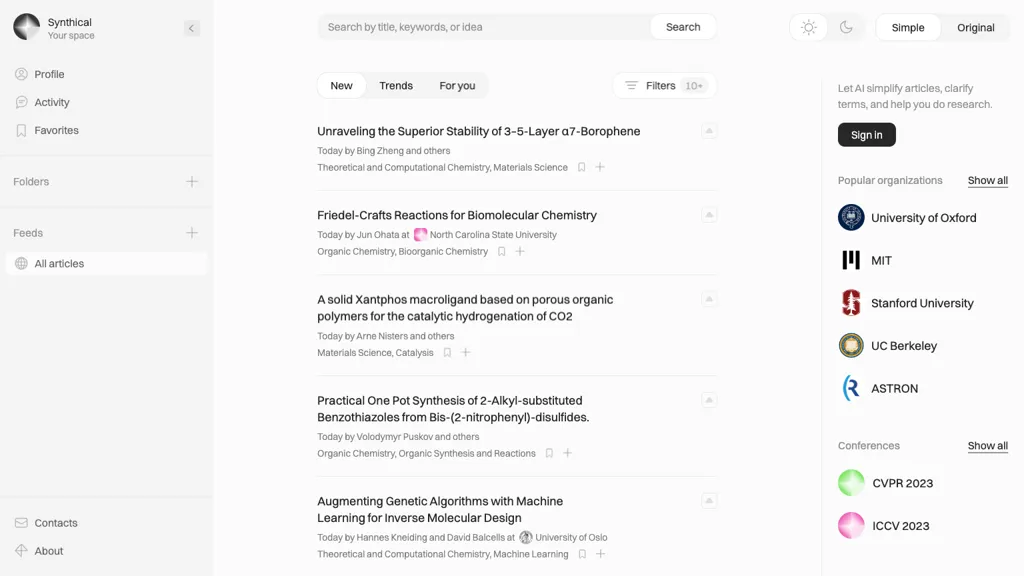What is Synthical: Science?
Synthical: Science is an AI-powered research tool designed to make scientific exploration easy in many fields of chemistry. This makes the process of uncovering trends and insights in theoretical computational chemistry and materials science much easier and more available. By harnessing the power of simple searches and filters, users are capable of diving into aspects like organic chemistry reactions, biomolecular chemistry, catalytic hydrogenation, and much more. Synthical also applies genetic algorithms and machine learning in inverse molecular design; that is why the tool is so versatile in contemporary scientific research.
Synthical: Science-Key Features & Benefits
Synthical: Science provides a wide range of various features toward improving the capability to conduct research by subscribers. Among them, the following are some key features:
- Ease of navigation in data by simple searching and filtering,
- The study of reactions in organic chemistry and biomolecular chemistry.
- Performing inverse molecular design by means of genetic algorithms and machine learning. Various sustainable technologies of water disinfection were studied. Investigation of photochemical reactions was performed; studies of solid electrolyte interphase are carried out.
The benefits brought about by Synthical: Science are the quick recognition of patterns within intricately interwoven sets of data, opening access to advanced AI-driven molecular design tools, and fostering eco-friendly research through the investigation of different sustainable technologies. The above features make Synthical an exclusive and valuable asset in the hands of a wide range of researchers in different scientific disciplines.
Synthical: Science Use Cases and Applications
Synthical can help scientific research in many ways. Here are some of them:
- Analyze theoretical computational chemistry trends, which will give insights into patterns that would be easy to spot.
- Apply genetic algorithms and machine learning to inverse molecular design by which scientists can explore new solutions for molecular structures and compounds.
- Enhance research in environmental chemistry, such as studying sustainable technologies for water disinfection and transformer-based molecular design.
Other industries that can take advantage of Synthical: Science include but are not limited to academic research, chemical engineering, and materials science. Some success stories related to the platform involve work done on eco-friendly solutions and molecular designs.
How to Use Synthical: Science
Using Synthical: Science is quite straightforward. It has a very user-friendly interface. Here’s how you would go about it, step by step:
- Create an account on Synthical: Science.
- After logging in, proceed to the search bar to query whatever you need.
- Apply filters to focus on your target in view of specific needs.
- Go through the results and utilize all AI functionalities for deeper insights.
- Save and report as you progress.
Best practice would be to refresh your search criteria often and maximize use of the available AI tools. The user interface is intuitive, making navigation and analysis quite hassle-free.
How Synthical: Science Works
Synthical is powered with sophisticated AI technologies, such as genetic algorithms and machine learning models, so as to provide researchers with the facility for complex scientific research. This can be given in a technical overview as stated below:
-
Genetic Algorithms:
It is used in inverse molecular design, showing ways to new molecular structures. -
Machine Learning Models:
It is perusing voluminous datasets and producing insight from such data by finding out patterns. -
Transformer-based Molecular Design:
Advanced technology for the design and optimization of molecular structures.
It therefore involves inputting search criteria, filtering results, and using AI tools to analyze such data and generate reports.
Synthical: Science Pros and Cons
As with any tool, Synthical: Science has both its advantages and disadvantages;
Pros
- Deep search with filtering to ensure ease in data navigation.
- Advanced AI tooling in molecular design and data analysis.
- Facilitates eco-friendly research on sustainable technologies.
Cons
- It takes time to get used to it if the user does not deal with AI tools.
- This could limit accessibility to those researchers that are not well-funded.
On the whole, user feedback has been very positive, with most users praising it for the fact that it simplifies intricate research areas into manageable and insightful processes.
Synthical: Science Price
Synthical: Science pricing plans are available for various users’ needs. Though specific information may fluctuate, generally speaking, the structure consists of:
-
Basic Plan:
This model is intended for the lone researcher who needs only the basic features and tools. -
Professional Plan:
More features and support, intended for research teams and academic institutions. -
Enterprise Plan:
Full access to all features, for large organizations and extended research projects.
Pricing Compared to Competitors:
Synthical: Science is competitive on the pricing structure and has emphasized much on value for money with its advanced AI and user interface.
Conclusion about Synthical: Science
Synthical is an AI-driven research assistant with a comprehensive suite of features to support scientific exploration in multiple disciplines. It is amazingly good at simplifying complex data analysis and has advanced tools for molecular design, making it a high-value instrument for researchers. For some users, there might be a period of learning for this particular concept, but all in all, this outweighs possible drawbacks.
It also means that, as with all the good things in life, this tool will receive further improvement with future developments and updates, thus making it an even more indispensable resource for scientific research.
Synthical: Science FAQs
Here are a few question answers about Synthical: Science:
-
What kind of research can one do using Synthical: Science?
Synthical: Science is useful for research in computational chemistry, material sciences, organic chemistry, and environmental chemistry. -
Is Synthical: Science applicable for academic purposes?
Indeed, it finds broad applications in academic circles, especially among researchers, professors, and graduate students. -
What support options does Synthical: Science have?
Among the many varied support options, Synthical: Science has user guides, tutorials, and customer support for troubleshooting and assistance in general.










